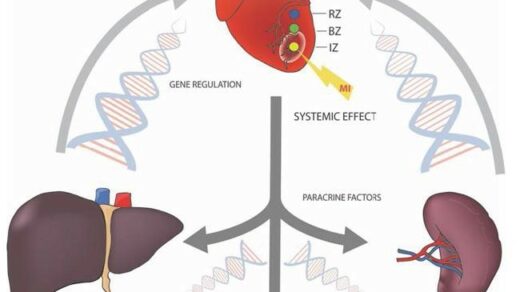The Trending With Impact series highlights Oncotarget publications attracting higher visibility among readers around the world online, in the news and on social media—beyond normal readership levels. Look for future science news about the latest trending publications here, and at Oncotarget.com.
—
There are several theories that attempt to explain the genesis of cancer. One prominent theory is the genetic theory—proposing that cancer may arise from the accumulation of genetic mutations that alter the normal functioning of cells. These mutations can drive the formation of tumors, which can then spread to other parts of the body in a process known as metastasis. Metastatic cancer is often difficult to treat because it has evolved to become resistant to standard therapies.
“It is generally accepted that development of cancer is a slow process, likely spanning decades during which the developing neoplastic cells sequentially acquire genomic alterations that will eventually give rise to the primary tumor [1].”
In a new editorial, researchers Ditte S. Christensen and Nicolai J. Birkbak from Aarhus University discuss mechanisms of genomic evolution in metastatic cancer, how therapy can drive it and the implications for developing new treatments. Their editorial paper was published in Oncotarget on March 21, 2023, entitled, “Therapy drives genomic evolution in metastatic cancer.”
Therapy Can Drive Metastatic Cancer
Cancer cells are master adaptors and have a remarkable ability to evolve, especially in response to therapy. When cancer cells are exposed to chemotherapy, radiation or targeted therapies, they can develop resistance to these treatments by acquiring new genetic mutations. This can occur through a variety of mechanisms, including mutations in the genes that regulate cell division and DNA repair, as well as the acquisition of new genes that confer resistance to specific drugs.
In this editorial, the authors discuss how this process of genomic evolution can lead to the development of metastatic cancer. As cancer cells acquire new mutations that allow them to survive and grow in the presence of therapy, they may also acquire mutations that allow them to invade and colonize new tissues. This can lead to the development of new tumors in distant parts of the body, which are often more difficult to treat than the original tumor.
“How the ability to perform these multiple independent steps is acquired by cancer cells remains a mystery.”
Mechanisms of Metastatic Cancer
Understanding the mechanisms by which cancer cells evolve in response to therapy is essential for developing new treatments for metastatic cancer. The clonal bottleneck hypothesis and the gatekeeper mutation hypothesis are two different hypotheses that attempt to explain how cancer cells acquire the ability to metastasize and spread to distant parts of the body. The clonal bottleneck hypothesis proposes that metastatic cancer is the result of a single subclone of cancer cells from the primary tumor that successfully seeds new sites. According to this hypothesis, the cancer cells undergo a clonal bottleneck event where only a small number of cells from the primary tumor are able to survive and successfully colonize new tissues. This hypothesis suggests that the ability to metastasize is an inherent property of the subclone that successfully colonizes new sites.
On the other hand, the gatekeeper mutation hypothesis proposes that metastatic cancer is the result of a specific genetic mutation or mutations that act as gatekeepers, allowing cancer cells to metastasize and spread to new sites. According to this hypothesis, the ability to metastasize is acquired through the acquisition of one or more specific genetic mutations that allow cancer cells to bypass the normal checks and balances that prevent uncontrolled growth and invasion of surrounding tissues.
Exploring Gatekeeper Genomic Events
In a 2022 study, the authors of this editorial and their team explored the concept of gatekeeper genomic events by comparing primary and metastatic tumors on a large scale. Their large-scale analysis of more than 40,000 individual tumors from the AACR Genomics Evidence Neoplasia Information Exchange (GENIE) project found an increase in mutation burden and chromosomal instability in metastatic tumors, but no evidence of individual mutations driving the metastatic process itself. The concept of gatekeeper mutations remains a hypothesis, and further research is needed to explore this idea in more detail.
This study and others suggest that metastatic cancer dissemination involves a bottleneck event where a highly fit clone from a primary tumor successfully seeds distant sites. Strong selective pressure from anti-cancer therapy drives the acquisition of private driver mutations associated with therapy resistance in individual metastatic tumors. There is limited evidence for the existence of specific gatekeeper mutations. It is also possible that the primary driver of metastatic cancer is found outside the cancer cells.
“Indeed, it may be that a primary driver of metastatic cancer is to be found outside the cancer cells themselves, potentially through inflammation in the tumor-immune microenvironment or through interaction with a declining host immune system which may enable immune escape and sudden systemic dissemination by a highly proliferative primary tumor clone.”
Conclusions
In conclusion, the genetic theory of cancer proposes that cancer arises from genetic mutations that alter the normal functioning of cells, leading to the formation of tumors and metastasis. This editorial by Christensen and Birkbak highlights the process of genomic evolution in metastatic cancer and its implications for cancer treatment. Understanding the mechanisms by which cancer cells evolve in response to therapy is crucial for developing new treatments for metastatic cancer. Recent studies have shed light on the clonal origin of metastatic tumors and the role of selective pressure from anti-cancer therapy in the acquisition of private driver mutations associated with therapy resistance. While the concept of gatekeeper mutations remains a hypothesis, it is clear that the acquisition of aggressive cancer traits is the primary driver of metastatic potential. Further research is needed to explore this idea in more detail and develop effective therapies for metastatic cancer.
“It will be exciting to further explore these questions as more data becomes available on metastatic cancers, particularly with paired primary and metastatic tumor samples with sequential biopsies to facilitate the analysis of dynamic tumor evolution over time, rather than through static snapshots provided by samples obtained at a single time point.”
Click here to read the full editorial published in Oncotarget.
—
Oncotarget is an open-access, peer-reviewed journal that has published primarily oncology-focused research papers since 2010. These papers are available to readers (at no cost and free of subscription barriers) in a continuous publishing format at Oncotarget.com. Oncotarget is indexed/archived on MEDLINE / PMC / PubMed.
Click here to subscribe to Oncotarget publication updates.
For media inquiries, please contact media@impactjournals.com.



